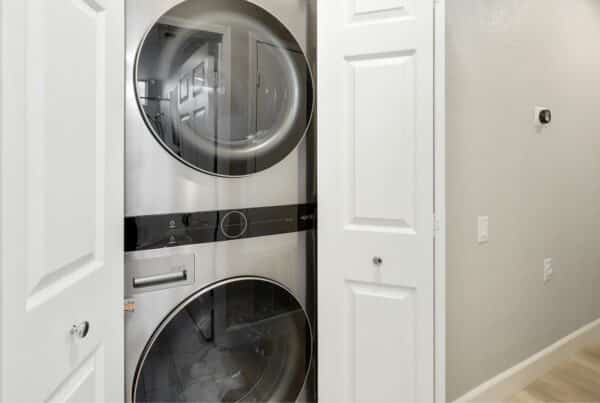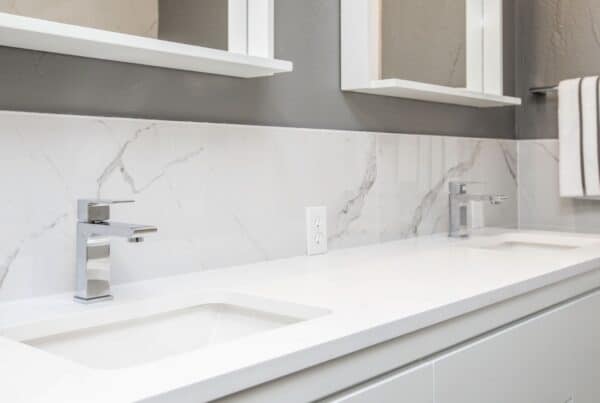
Bleach is widely recognized for its potent disinfecting and whitening capabilities. It’s a common household chemical that serves various purposes, from cleaning tough stains to sanitizing surfaces. However, the use of bleach must be handled with care, particularly when considering disposing of it or using it within your plumbing system. In this article, learn about bleach and if you can pour it down the drain, as well as the environmental impacts.
The Power of Bleach
Bleach contains sodium hypochlorite, which gives it strong oxidizing properties. Additionally, this makes it effective in killing bacteria, viruses, and fungi, breaking down stains, and even neutralizing odors.
Can You Pour Bleach Down the Drain?
It is typically safe to pour a moderate amount of diluted bleach down the drain, provided that it’s followed by plenty of water. This helps to sanitize the drain and can prevent the growth of mold and mildew. When used sparingly, bleach can clean and deodorize drains. In fact, it interacts with the biofilm of organic materials that may line the pipes, helping to remove clogs and unpleasant smells.

What If You Accidentally Pour Bleach Down the Drain?
After pouring bleach down the drain, it begins to react with any organic matter present, potentially clearing away the buildup. However, if used excessively, it could corrode some types of plumbing or damage septic systems by killing beneficial bacteria. If you’ve accidentally poured bleach down the drain, flush the drain with at least 10 cups of water to dilute the bleach and reduce its concentration. Keep in mind that bleach should never be mixed with ammonia or acidic cleaners like vinegar as these combinations produce toxic gases called chloramines.
The Effects of Bleach on the Drain and Pipes
Over time, the corrosive nature of bleach can weaken the plumbing, especially plastic or metal pipes. It’s not recommended for frequent use in large quantities. There are other things out there that are better to use like baking soda and vinegar, followed by hot water, can provide a safer alternative solution for cleaning drains without the potential damage of harsh chemicals.
How Bleach Affects the Natural Balance of Bacteria in Septic Systems
Bleach not only harms drains, but can cause problems with septic. Septic systems rely on a delicate balance of bacteria and microorganisms to break down and treat household waste. These beneficial bacteria decompose organic matter, reducing solids and preventing the buildup of sludge within the system. When bleach enters a septic system, it can disrupt this natural process. Let’s look at the impact of bleach on septic systems.
Impact on Septic Systems:
- Destruction of Beneficial Bacteria: Bleach is an antimicrobial agent designed to kill bacteria and other pathogens. While this is useful for disinfection purposes, it can also indiscriminately destroy the beneficial bacteria in septic tanks that are essential for waste decomposition.
- Reduced Efficiency: With a diminished population of these microorganisms, the septic system becomes less efficient at processing waste. Additionally, this can lead to increased solids in the tank, potentially resulting in clogs, backups, and the need for more frequent pumping.
- System Failure: In extreme cases, the overuse of bleach can lead to complete failure of the septic system, necessitating costly repairs or replacement.
Environmental Impact:
- Contamination of Groundwater: A poorly functioning septic system can leak, allowing untreated or partially treated waste to seep into the groundwater, which can contaminate wells and other sources of drinking water.
- Harm to Aquatic Ecosystems: If contaminated water reaches streams, lakes, or oceans, it can introduce excess nutrients and pathogens, leading to algal blooms, oxygen depletion, and harm to fish and wildlife.
- Soil Degradation: The soil absorption field, or drain field, of a septic system is where the final treatment of effluent occurs through percolation into the soil. An imbalance caused by bleach can lead to inadequate treatment and soil contamination, affecting vegetation and soil organisms.
To avoid these issues, it’s important to use bleach sparingly and to consider alternative cleaning agents that are less harmful to the bacteria in septic systems. Additionally, regular maintenance and inspections of your septic system can help detect early signs of imbalance or malfunction, allowing for timely interventions to protect both the system and the environment.
How to Safely Dispose of Bleach
If you find you need to get rid of bleach, disposing of it properly is important. To dispose of bleach safely, it should be diluted with water and poured down the drain with the faucet running. Alternatively, follow local waste management guidelines for hazardous materials.
How to Prevent Drainage Problems
Now you know not to put bleach in the drain, and want to make sure you can prevent drainage issues. Also, preventing drainage problems is essential for maintaining a functional and healthy plumbing system. Here are several strategies to help avoid common issues:
Regular Maintenance:
- Routine Cleaning: Regularly clean drain stoppers and use strainers to catch hair, food particles, and other debris that can cause clogs.
- Professional Inspection: Schedule annual inspections with a professional plumber to identify and address any potential issues early on.
Mindful Usage:
- Dispose of Waste Properly: Never pour grease, oil, or fat down the drain as they solidify and cause blockages. Dispose of them in the trash instead.
- Watch What You Flush: Only human waste and toilet paper should be flushed. Also, avoid flushing wipes (even those labeled “flushable”), feminine hygiene products, cotton swabs, and other non-biodegradable items.
- Use Water Wisely: Run water regularly in rarely used drains to prevent odors and use cold water when running the garbage disposal to solidify grease and move it more easily through the pipes.
Natural Cleaners:
- Baking Soda and Vinegar: Use a mixture of baking soda and vinegar followed by hot water to naturally break down organic matter and keep drains clear without harsh chemicals.
- Enzymatic Cleaners: Consider using enzymatic drain cleaners that use natural bacteria to digest organic material and maintain a clear drain.
Safe Disposal of Chemicals:
- Proper Disposal of Hazardous Substances: Never pour hazardous chemicals down the drain. Check with your local waste management facility for proper disposal methods.
Installation Improvements:
- Water Softeners: If you have hard water, consider installing a water softener to reduce mineral buildup in your pipes.
- Backflow Prevention: Install backflow preventers where necessary to protect your plumbing from sewer backflows.
Emergency Preparedness:
- Know Your Plumbing: Familiarize yourself with the main water shut-off valve location in case of an emergency.
- Have Tools on Hand: Keep a plunger and a plumber’s snake available. These are used to deal with minor clogs before they become major problems.
By following these preventative measures, you can significantly reduce the risk of drainage problems. You can also ensure that your plumbing system remains in good working order. Remember that regular care and attention are the keys to avoiding costly and inconvenient repairs.
Other Drain Maintenance
Now that you know to not put bleach down the drain, let’s look at other areas of maintenance in the sinks and drains.
One of those is unclogging the dishwasher drain. To do this, locate and remove the dishwasher filters, clean the filters and the drain and check the plumbing connections. Then, turn on the garbage disposal, check the air gap on the sink, and clear the drain.
Another is fixing a leaky sink. This involves turning off the water supply and following the steps to make sure you can fix the leaky sink. As always, if it is too complicated, it is best to contact a professional.
Lastly, drains aren’t only under sinks. You may need a French Drain if you are having issues with accumulating water in the basement. This can help reroute water away from the house so you don’t have a wet basement. Also, it is a good idea to look into this and know as well that there are other alternatives too.
When Do I Call a Professional?
If you have concerns about your plumbing after using bleach or encounter persistent drainage problems, it’s prudent to call a professional plumber. Additionally, bleach is a chemical you don’t want to mess with. If you are having issues with it or the drains and don’t want to handle it alone, reach out to a professional.
Check out the video below about pouring bleach in the drain.
Conclusion
While bleach can be an effective cleaning agent for your drains, caution is advised. Also, regular use or high concentrations can lead to plumbing damage and environmental concerns. Opting for gentler alternatives and understanding safe disposal methods can ensure both effective cleaning and pipe longevity. While taking care of the drains in the home, this is a great time to call the Bentley Home Inspection team for a home inspection in East Tennessee and surrounding areas.




